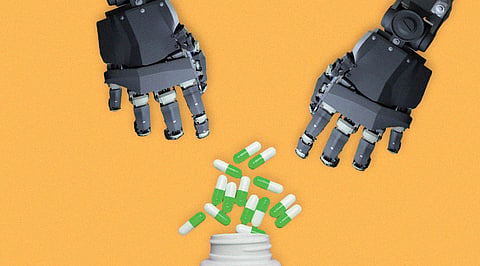

Artificial Intelligence is transmuting the system and methods of the healthcare industries. Artificial Intelligence and healthcare were found together over half a century. The healthcare industries use Natural Language Processes to categorize certain data patterns. Natural Language Process is the process of giving a computer the ability to understand the text and spoken words just like the way human beings can. In the healthcare sector, it gives the effect to clinical decision support. The natural language process uses algorithms that can mimic human responses to conversations and queries. This NLP, just like a human, can take the form of a simulated mediator using algorithms to connect to the health plan members.
Artificial Intelligence can be used in clinical trials, to hasten the searches and validation of medical coding. This can help reduce the time to start, improve and accomplish clinical training. In simple words, medical coding is transmitting medical data about a patient into alphanumeric code.
There is no doubt that AI has become a far-reaching technology. It is becoming increasingly elegant at doing what humans do efficiently like learning, reasoning, and applying logic.
With Artificial Intelligence, learning algorithms are becoming more accurate and precise as they enable us to gain knowledge of diagnostics, treatments, and care processes.
Here is a list of some real-world applications of Artificial Intelligence in medicine that benefit both patients and physicians.
One of the first applications of AI in medicine is the early detection of atrial fibrillation. There is a mobile application called 'Kardia' which enables a smartphone-based ECG monitoring and detection of atrial fibrillation. Remote ECG monitoring with Kardia in ambulatory patients is more likely to identify atrial fibrillation than routine care. Apple also acquired FDA approval for their Apple Watch 4 that enables for easy acquisition of ECG and detection of atrial fibrillation that can be shared with the practitioner of choice through a smartphone.
According to the electronic patient records it is observed that AI has been used to envisage the risk of cardiovascular disease. For instance, severe coronary syndrome and heart failure.
The development of AI applications in pulmonary medicine is increasing to a large extent. AI-based software provides more detailed and exact explication and serves as a decision support tool in the terms of elucidating results from pulmonary function tests.
Round-the-clock glucose monitoring allows patients with diabetes to view real-time interstitial glucose readings and serves information on the direction and rate of change of blood glucose levels. Medtronic derived the FDA approval for their Guardian system for glucose monitoring, which is smartphone-paired. In 2018, the company partnered with Watson (AI developed by IBM) for their Sugar.IQ system to aid their customers to better prevent hypoglycaemic episodes based on unremitting measurement. Constant blood glucose monitoring can allow patients to optimize their blood glucose control and reduce the stigma associated with hypoglycaemic episodes.
In clinical nephrology, AI has been applied in numerous settings. The application of AI has been proved useful for the projection of the decreased glomerular filtration rate in patients with polycystic kidney disease and for establishing risk for increasing IgA nephropathy.
The specialty of gastroenterology benefits from a wide range of AI applications in clinical settings. Gastroenterologists made use of convolutional neural networks among other deep learning models to process images from endoscopy and ultrasound and discover abnormal structures such as colonic polyps. Artificial neural networks have also been used to determine gastroesophageal reflux disease and atrophic gastritis, as well as to project outcomes in gastrointestinal bleeding, survival of oesophageal cancer, inflammatory bowel disease, and metastasis in colorectal cancer and oesophageal squamous cell carcinoma.
Apart from these AI also helps in the faster drug development process, virtual nursing assistants, provide personalized treatment, enhance gene editing.
Join our WhatsApp Channel to get the latest news, exclusives and videos on WhatsApp
_____________
Disclaimer: Analytics Insight does not provide financial advice or guidance. Also note that the cryptocurrencies mentioned/listed on the website could potentially be scams, i.e. designed to induce you to invest financial resources that may be lost forever and not be recoverable once investments are made. You are responsible for conducting your own research (DYOR) before making any investments. Read more here.
